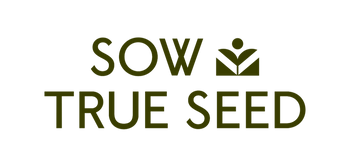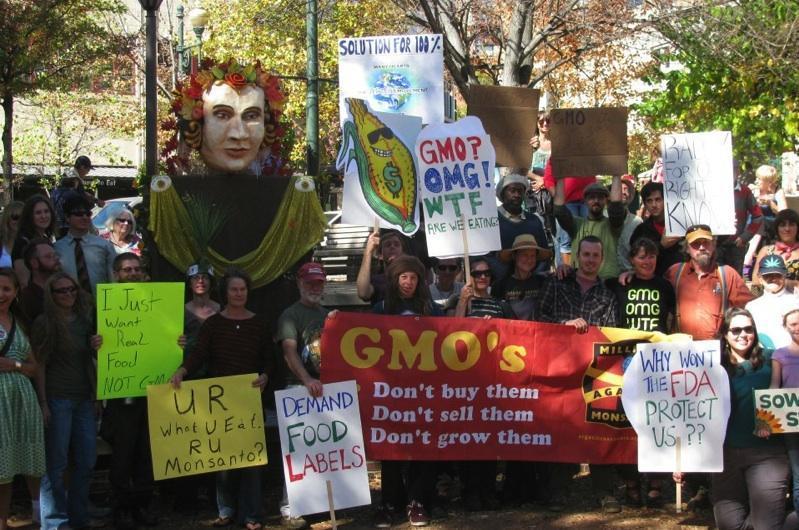
Like millions of people around the world, Sow True Seed is firmly against using GMOs (Genetically Modified Organisms) in seed. Banned or restricted in many dozens of countries across the globe (including the Europeon Union, China, Egypt, Brazil to name a few), America is far behind. Not only do we allow huge monoculture farming of GMO seed on millions of acres especially in the midwest, but we don’t even require labeling of GMO products and produce in this country. The vast majority of corn, soybeans, sugar beets, canola (rapeseed) and cotton in the USA is now genetically modified. Almost all packaged foods produced in America are now assumed to contain GMOs – and because the USDA does not require labeling, the proliferation of GMOs is virtually unknown and uncontested. When asked if they would like to know they are eating GMOs, a resounding majority of Americans reply “Yes!” – so, now is the time to demand food transparency by requiring products containing GMOs to be adequately labeled.
Sow True Seed agrees with the many scientists and small studies that GMOs have not been adequately tested for their effects on human or animal health. We believe that GMOs negatively affect natural ecosystems and that the flow of GMO genes by cross pollination, into non GE (genetically engineered) crops, especially the grains, are almost unstoppable and may well be irreparable. It is almost inevitable that in just a few years, we will not have the freedom to grow or eat non-GMO grains – corn, soy, alfalfa, canola — as our entire food source will be contaminated.
As our name says, Sow True Seed’s job is to provide seeds that grow true, when saved and replanted, year after year. That means keeping our seed open-pollinated, and when we can, organic or ECO grown, and in all cases, uncontaminated from GMOs. This is getting harder every year. Since many of the grains are wind pollinated, preventing contamination from neighboring GMO crops is virtually impossible. If a farmer is using GMO corn, for example, and the pollen from his plants blows onto neighboring farmers’ crops, the GMOs will contaminate the neighbor’s plants. He/she cannot sell produce from that field and call it organic, even if they are a Certified Organic farm. Further, eating that produce may not be safe, and saving the seed from those crops will not grow true to the type the farmer planted. And to add insult to injury, should that farmer save her/his seeds to plant next year, they have a good chance of being sued by Monsanto for saving seed that Monsanto has patented. Unless we come together to demand GMO labeling and GMO-free areas, the country’s seed and food supply could become severely compromised in this way in just a few years. Sow True Seed believes GMOs pose a threat to America’s agriculture, and while we want to see change on a national scale, we know to affect change, we must start local (for international inspiration, check out Vandana Shiva).
Because this issue is so important to us and our customers, we are engaging in action to protect seeds. Our petition GMO-FREE WNC was officially launched at a Rally for the Right to Know in 2011 in Asheville, NC. Our GMO-FREE WNC campaign calls for the designation of Western North Carolina, one of the most plant diverse regions in the world, as a GMO-crop free zone. The petition supports the consumers, farmers and gardeners of Western North Carolina (WNC) by seeking to establish agriculture zones that are free from genetically modified (GM) crops and by asking for regulations to establish food labeling for ingredients containing GMOs.
Some practical advice on how to combat the proliferation of GMOs:
1. Start a Victory Garden
Reclaim your food supply and grow your own nutrient-dense vegetables, fruits, and herbs.
2. Collaborate
Work with your community to establish goals for sustainability (i.e. a chicken cooperative for eggs, a community vegetable garden for shared veggies, etc.)
3. Buy Local & Request GMO-free products
What you can’t produce yourself, purchase at tailgate and local farmer’s markets. You’ll be able to talk to the farmer directly, and purchase fresher, safer, and more nutrient-rich foods!
4. Tell Everyone
This issue affects every single person in the world, so talk to people in your immediate community about GMOs. Ask your grocery store to help you purchase their GMO-Free items. Ask your favorite restaurant if their food is GMO-Free. They may not know, or it may not be, but at least you’ve started an important dialogue.



